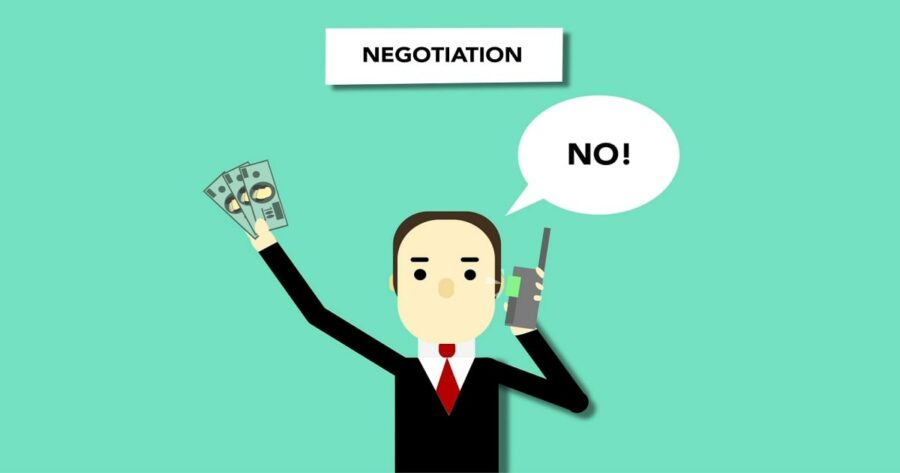Negotiating Your Compensation, Are You Willing to Walk Away?
- Nick Kossovan
- The Art of Finding Work
- Trending
- February 2, 2023

You’ve gone through a phone interview and 2 face-to-face interviews, and a Myers-Briggs Personality Test. You like the company. Your last interview was with the person who’d be your boss—you bonded, you connected. The following day HR calls to inform you they’ll be emailing you an offer. Anxiously you check your emails every 5 minutes. Finally, on your sixth email check the offer! It’s $20K less than you expected. Now what?
You negotiate!
Most job seekers fear they’ll appear greedy and lose the job offer if they ask for more money. That’s rarely the case. Finding a hire-worthy candidate isn’t easy. When you’re a good fit for the job, it’s in the hiring manager’s best interest to make an offer you’re satisfied with. Even if there’s no wiggle room, the offer isn’t going away; it’ll stay on the table until you either accept it or reject it.
The key to successfully negotiating compensation is to be prepared. Know what your skills are worth on the market. With all the salary information available online, there’s no excuse to not have a ballpark salary in mind. Make sure to factor in where you live. Salaries can vary significantly from city to city, region to region. Visit websites such as Payscale.com, Salary.com and Glassdoor.com that offer salary comparisons across various roles and industries.
It is common to ask applicants about their salary expectations early in the hiring process, usually during the phone vetting interview. Play it safe; you don’t want to give a too low or a too high salary figure. Defer answering the question by stating you’d like to learn more about the job’s duties and accountabilities before discussing compensation. Your goal is to make the employer like you, see you as an excellent fit for the position and company, and ultimately fall in love with you before discussing compensation.
Adhere to the cardinal rule: Don’t bring up salary! You may be negotiating against yourself if you throw out the first number. The employer may have been willing to make a higher offer than you had proposed. Your offer will likely be higher than expected if you’ve demonstrated an undeniable track record of success (“proven” is much more valuable than “unproven”). Therefore, you should emphasize proving (quantifying) your value throughout the hiring process.
If the offer is lower than you expected, make a counteroffer based on your salary research. Depending on what the hiring manager says and how much you want to work for the company, consider negotiating to receive a raise six months into the role if you meet agreed-upon goals. (IMPORTANT: Get this in writing!)
Many candidates make the mistake of only negotiating money. (salary, commission, bonuses) Other aspects of compensation can be negotiated, such as vacation time, work hours, perks, working from home, or a hybrid model, medical/dental benefits, tuition reimbursement, RRSP matching percentage, fitness and wellness subsidies, stock options, etc. Don’t underestimate the outcomes of negotiating non-salary benefits.
The bottom line:
To get the compensation package you feel you deserve, which is highly subjective, you must be willing to walk away. Walking away frees you to continue looking for a company that’ll agree to the compensation you desire. Never talk yourself into accepting a job offer! Either the compensation package offered works for you, or it doesn’t. If the hiring manager informs you that your compensation requests aren’t feasible, you have two choices:
- Thank them for their time and continue your job search, or
- Accept the offer WITHOUT expecting a raise or promotion later. (Unless you have it in writing, you’ll receive a raise after meeting agreed-upon goals within six months or whatever timeframe you negotiate.).
I believe if the employer’s final offer doesn’t provide the compensation you want, you’re better off walking away. Hoping you’ll be recognized for your work and given a 15% raise is a bad strategy.
Negotiating compensation with candidates has taught me the most common reason people want more money is their lifestyle. This isn’t a solid reason to convince an employer why you deserve the compensation you’re asking for. Employers aren’t responsible for the lifestyle you created. You created your lifestyle, not the employer.
Before walking away, understand that ultimately your job satisfaction hinges less on getting your compensation negotiation right and more on getting the job right. The industry and position in which you work, your career trajectory, and the daily influences on you (e.g., management, coworkers) are significantly more important than the specifics of a job offer.
______________________________________________________________
Nick Kossovan, a well-seasoned veteran of the corporate landscape, offers advice on searching for a job. You can send Nick your questions at artoffindingwork@gmail.com.








